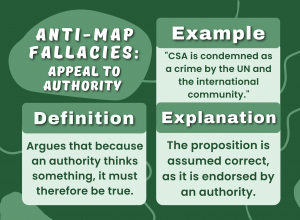One of our staff members is contributing considerably to a News Archiving service at Mu. Any well educated (Masters, PhD or above) users who wish to make comments on news sites, please contact Jim Burton directly rather than using this list, and we can work on maximising view count.
Debate Guide: It's wrong because it's illegal: Difference between revisions
The Admins (talk | contribs) No edit summary |
Jim Burton (talk | contribs) No edit summary |
||
| Line 2: | Line 2: | ||
<blockquote><font color="green">'''''Adult-minor sex is wrong, period! <u>Most societies rightly condemn and criminalize it</u>, so how can it be OK?'''''</font></blockquote> | <blockquote><font color="green">'''''Adult-minor sex is wrong, period! <u>Most societies rightly condemn and criminalize it</u>, so how can it be OK?'''''</font></blockquote> | ||
[[Age of Consent|Ages of consent]], as has already been acknowledged, are variable geographically, but also over time. Law is an evolving system of codified moral standards which vary according to the place on earth, time in history, and may be ''enforced'' to a greater or lesser degree. Recency in legal trends is not evidence of moral authority, nor efficacy, and different laws may be more or less appropriate for the societies they are designed to govern. | |||
According to your opponent's very basic legalistic morality, gay sex has gone from being 'wrong' to 'more/totally acceptable' in a number of recent societies, as the laws changed and were eventually equalized. Gay sex would also be wrong in some | Laws, being written before the act and involving nothing more than subjective judgments, ''thus'' have no ethical authority over the rightness of any practice. One example that demonstrates this is [[Wikipedia:Miscegenation|miscegnation]], but lets instead cover gay sex: | ||
According to your opponent's very basic legalistic morality, gay sex has gone from being 'wrong' to 'more/totally acceptable' in a number of recent societies, as the laws changed and were eventually equalized. Gay sex would also be wrong in some regions of the world that tend to outlaw it, but not elsewhere! If the circular reasoning of "illegal = wrong = illegal" was a vaild argument, all forms of deregulation would automatically be immoral and irresponsible. There would be no acceptable reason for the legalization of any human behavior; i.e. we would all be living in an authoritarian dictatorship by the time a few governments had been given the chance to outlaw their freedoms and vices of choice. | |||
==Fallacies and cognitive distortions covered== | ==Fallacies and cognitive distortions covered== | ||
Latest revision as of 16:00, 10 April 2025

Adult-minor sex is wrong, period! Most societies rightly condemn and criminalize it, so how can it be OK?
Ages of consent, as has already been acknowledged, are variable geographically, but also over time. Law is an evolving system of codified moral standards which vary according to the place on earth, time in history, and may be enforced to a greater or lesser degree. Recency in legal trends is not evidence of moral authority, nor efficacy, and different laws may be more or less appropriate for the societies they are designed to govern.
Laws, being written before the act and involving nothing more than subjective judgments, thus have no ethical authority over the rightness of any practice. One example that demonstrates this is miscegnation, but lets instead cover gay sex:
According to your opponent's very basic legalistic morality, gay sex has gone from being 'wrong' to 'more/totally acceptable' in a number of recent societies, as the laws changed and were eventually equalized. Gay sex would also be wrong in some regions of the world that tend to outlaw it, but not elsewhere! If the circular reasoning of "illegal = wrong = illegal" was a vaild argument, all forms of deregulation would automatically be immoral and irresponsible. There would be no acceptable reason for the legalization of any human behavior; i.e. we would all be living in an authoritarian dictatorship by the time a few governments had been given the chance to outlaw their freedoms and vices of choice.
Fallacies and cognitive distortions covered
See also, our dedicated article:
- Appeal to authority.
- Circulus in probando fallacy: The reasoning behind this argument is a fallacious circular ("We know it is wrong because it was made illegal because it's wrong").
- Cognitive distortion: Musturbation.
See also
Wikipedia:
- Is–ought problem - Proponents of this argument show a general inability to distinguish is from ought statements.